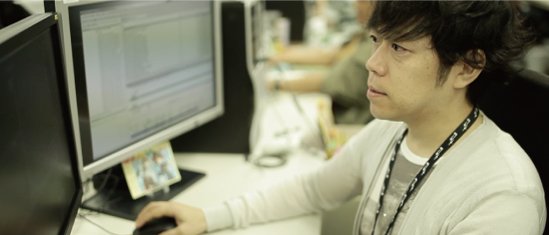(Continues from Part 1.)
An Environment in which Games Thrive
Shibata: I feel that in the early days of the video game industry, graphic designers commanded very little status. Although the players might praise our work, within the company we were treated badly by the programmers. There were times it was hard to bear…
Kai: It wasn’t like that working on console games, but I remember working on an arcade game once and getting mistreated by one of the programmers. Back then you had these three main factions on the team: character designers, programmers, and game designers. Everybody stayed within their own territory, saying, “I’ve done my job, now this is up to you.”
 Shibata: I come from an arcade background, so I was under the impression that that’s just how things worked.
Shibata: I come from an arcade background, so I was under the impression that that’s just how things worked.
Kai: As someone who has seen both sides, I can say that console game teams were a lot less divided.
Shibata: That’s interesting to hear. I moved over to console games to work on Resident Evil 3, and was shocked by how different the work environment was. I thought maybe that atmosphere was unique to the Resident Evil team, but it sounds like it’s true of most console development.
Kai: I wasn’t a part of the RE3 team, so I can’t say for certain, but it sounds like when this team composed of people from both console and arcade backgrounds came together, they ended up adopting the console team’s “cross-border” approach. This is the approach we’ve inherited here at Platinum. However, it’s something we came to not through an explicit rule or policy, but rather because of the number of people on the team who felt that’s how it should be.
Shibata: Without a doubt, this approach leads to better games.

Kai: Of course, there may be some people who prefer staying within their own little niche, but when you’re in a studio working with a group of other people, this rarely leads to the best results. PlatinumGames is made up of people who understand this.
Shibata: I’m thankful that we have producers who are committed to fostering the kind of environment that leads to the creation of great games.
(Continues to Part 3.)
interview by editorial studio MUESUM (2012/08/03)